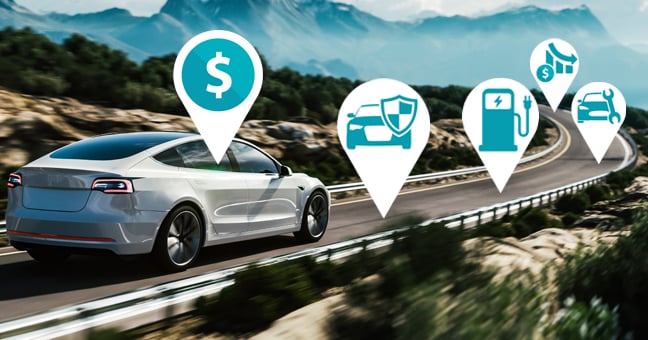

May 16 2023
In a previous article, we discussed some of the key components of EVs and how they differ from the makeup of traditional internal combustion engine (ICE) vehicles.
In this article, we wanted to take a look at how these EV components drive the cost of ownership, including not just the initial purchase price, but expenses throughout the life of the vehicle, such as maintenance and repair, fuel, insurance, and depreciation. Additionally, we wanted to compare the cost of EV ownership to traditional ICE vehicles to ultimately determine which type of vehicle is more affordable to own.
One of the factors keeping consumers from purchasing an EV over a traditional ICE vehicle is the initial purchase price. According to Kelley Blue Book (back in April 2022), the average price of a new electric vehicle is over $65K which is more closely aligned with luxury prices than mainstream prices. This is largely due to the cost of the battery, the main component of an EV and the most expensive to produce.
While the upfront cost is higher, there are tax credits and incentives available at the government level, and in many cases, at a state level as well, helping to offset that higher sticker price. Additionally, as the cost of battery production decreases, we should expect to see more competitive pricing.
Though the sticker price of an EV is more expensive than an equivalent ICE model, they are typically less expensive to maintain throughout the life of the vehicle. This is due to the significantly fewer moving parts of an EV, which means fewer parts to maintain. Spark plug and timing belt replacements are a thing of the past. Additionally, brake pads and rotors do not need to be replaced as frequently with the help of regenerative braking preserving the brakes for longer.
All that being said, if you find yourself needing to repair or replace the battery, those savings get erased. According to Recurrent, replacement batteries range from $5-20k based on the pack. Fortunately, EV batteries are expected to last for 15-20 years, according to the car makers, and are covered under manufacturer warranty typically up to 8 years or 100k miles. So, it’s highly unlikely that the battery’s life with precede the vehicle’s life.
One of the biggest selling points for EVs is the savings on fuel throughout the life of the vehicle. Gas prices have been hovering around $3+ per gallon in recent years, so the lower cost of electricity is quite appealing to many consumers. Though, as we mentioned in an earlier EV article, the gap is not quite as big in areas where the cost of electricity has skyrocketed, or EV owners rely on public charging where the cost per kWh is much more expensive than home charging. In fact, according to an Anderson Economic Group study conducted in Q4 of 2022, refueling EVs was actually more expensive.
Insuring EVs can be a challenge, specifically because of the expensive and irreparable battery. According to a Reuters article, “there is no way to repair or assess even slightly damaged battery packs after accidents, forcing insurance companies to write off cars with few miles.” As such, insurance companies have no choice but to price these policies higher to assure they’re not losing money on all these total loss claims. However, according to a Forbes Advisor article, the cost of insurance for EVs is only about $100 more per year in comparison to similar gas-powered models.
Another thing to consider when purchasing any type of vehicle is how well it retains value. Unfortunately, depreciation is inescapable regardless of whether the vehicle is electric or gas-powered. Predicting how well an EV will retain its value may be one of the most unknown variables in determining the cost to ownership. This Business Insider article does a pretty good job describing the mystery of EV resale values.
So, here’s the big question… despite the larger upfront cost of EVs, will EV owners end up saving money in the long run by switching to electric? There are a number of variables that determine the answer:
Best-case scenario, EV owners will realize savings on fuel and maintenance/repairs to offset the initial cost of the vehicle and its slightly higher annual insurance fee. Hopefully, these EVs will eventually resell at a higher price than a comparable traditional vehicle model, though as described above, this is still a mystery.
Worst-case scenario, the battery gets damaged or significantly depleted outside of the manufacturer's warranty and renders the vehicle worthless.
In some scenarios, where there isn't much of a savings on fuel, but major repairs aren’t required, there may not be that big of a difference in the cost of ownership for similar EV/ICE models. There are still many unknowns to determine the full cost of ownership for EVs, and how they stack up against the cost of owning an ICE vehicle. However, it appears that in most scenarios, EVs can be a feasible option if consumers are able to afford the higher sticker price.